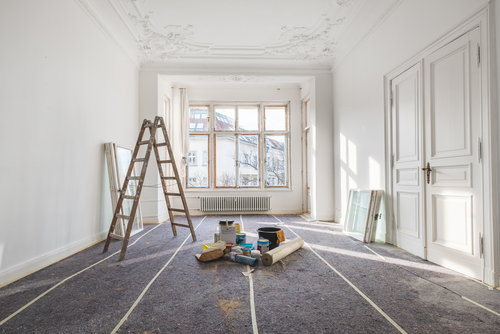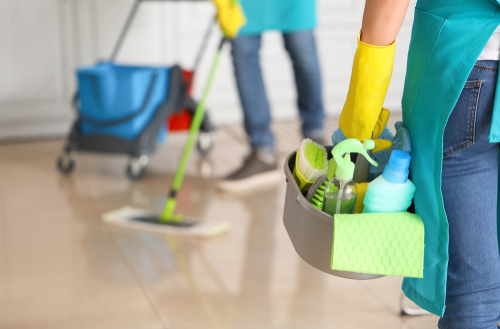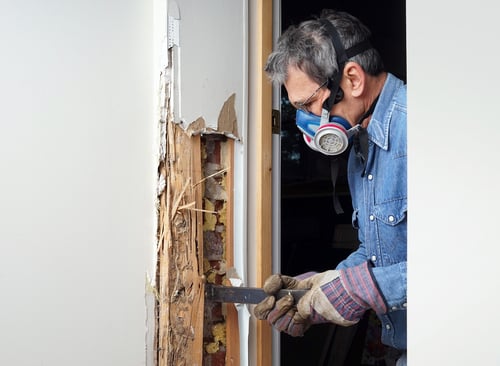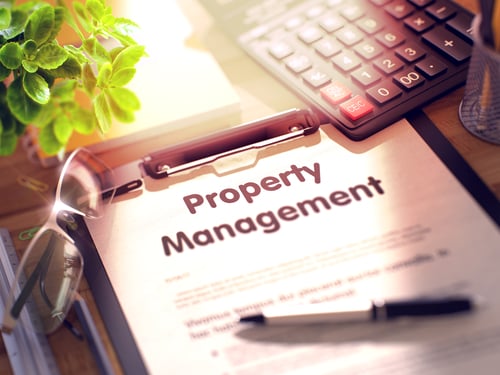
Maintenance within a rental home is necessary for both landlords and tenants. Although landlords have many responsibilities within their rental properties, tenants must keep up with regular maintenance procedures to maintain a safe living space. With that, it’s imperative to outline landlord and tenant responsibilities clearly from the start.
Failure to state maintenance procedures for tenants in the lease may lead to disputes and frustration. To avoid these situations, landlords should list all responsibilities for tenants within the lease. Similarly, they should communicate with the tenant and make sure that they know all of your expectations. That said, let’s go over some of the primary responsibilities for both tenants and landlords.
Who is Responsible for Maintenance in a Rental Home?
When it comes to maintaining a rental home, landlords hold a lot of responsibility. However, tenants are responsible for many day-to-day tasks to help maintain the property. That said, both tenants and landlords are responsible for maintenance procedures within a rental home.
Keep in mind that the responsibilities differ for landlords and tenants depending on the lease contract. Therefore, it’s up to the landlord or property management company to construct a comprehensive lease agreement that clearly states the tenant’s responsibilities and the landlord.
Some of the most common maintenance procedures within a rental home include:
- Maintaining the exterior of the home
- Ensuring the structural integrity of the property
- Preventing and treating mold problems
- Promptly addressing safety hazards
- Maintaining a sanitary environment
Although it depends on the lease agreement, landlords and tenants are responsible for different tasks. For example, tenants should take care of daily tasks, like maintaining a sanitary environment. On the other hand, landlords should take care of large property maintenance tasks, like ensuring the water, plumbing, heat, and electricity are all working. That said, let’s go over some of the maintenance procedures that tenants should follow while living in a rental property.
What Maintenance Procedures Should Tenants Follow?
All tenants want to live in a safe and well-maintained rental property. Therefore, tenants should be aware of their necessary maintenance tasks and follow them as needed. Next, let’s go over some standard maintenance procedures that most tenants should follow per their lease contract.
- Keeping Up With All Housing and Occupancy Codes
- Maintaining a Sanitary Environment
- Keeping the Property Free of Hazards
- Seasonal Maintenance Procedures
- Reporting Any Maintenance Issues
- Additional Maintenance Procedures for Tenants
Keeping Up With All Housing and Occupancy Codes
Tenants are responsible for complying with all state and local codes, as well as occupancy standards. Additionally, they must follow what is stated in their lease agreement. That said, most places don’t allow more than two occupants per bedroom. So, tenants should avoid frequent or long-term houseguests. Not only could this cause higher utility costs and more wear and tear on the home, but unauthorized tenants could also become a fire or safety hazard.
Maintaining a Sanitary Environment

As most people already know, keeping a sanitary environment is one of the most important maintenance steps you can take in a rental home. Avoiding unsanitary conditions by keeping a clean house is one task that all occupants are responsible for. Since tenants live on the property each day, it’s crucial to maintain a clean environment to minimize damage to the rental unit and avoid health complications for occupants.
It’s not uncommon for rental homes to experience rodent or insect issues. To avoid attracting critters to the rental property, tenants should keep the area well-maintained. That said, keeping your rental home clean is one of the essential maintenance procedures.
Keeping the Property Free of Hazards
Like keeping your rental home clean, it must be free of safety hazards as well. With that, tenants should avoid any safety issues for themselves and the property. Some of the most common safety concerns within a rental home include:
- Emergency exits blocked with personal belongings
- Personal items kept too close to critical equipment such as the water heater or breaker box
- Smoke detectors or carbon monoxide detectors are tampered with
These scenarios can cause unnecessary safety concerns for tenants and their guests. That said, tenants must be aware of safety concerns around the property to protect themselves and the rental home.
Seasonal Maintenance Procedures
Typically, in a single-family rental home, the tenant is responsible for many seasonal maintenance tasks. On the other hand, the landlord or property management company may be in charge of seasonal jobs in a multi-family building. Some of the most common seasonal maintenance procedures in a rental include:
- Mowing the lawn
- Raking up leaves and debris
- Shoveling snow off pathways and driveways
- Dispersing salt over icy walkways
Whether it’s the tenant’s or the landlord’s responsibility, seasonal maintenance tasks must be done to protect the safety of the home and its occupants.
Reporting Any Maintenance Issues
Reporting a maintenance issue is one of the most critical procedures to follow while living in a rental. Tenants should promptly report any problems or repair needs to the landlord upon noticing them.
Although it’s easy to push maintenance to the side, it’s essential to contact your landlord if repairs are necessary. After all, they can’t fix the issue if they don’t know about it. Similarly, tenants may be held responsible for any further damage due to delayed repairs.
Additional Maintenance Procedures for Tenants
While there are specific tasks that all tenants are responsible for per their lease contract, there are additional maintenance tasks that rental occupants should follow as well. That said, most duties revolve around maintaining fixtures and preventing damage within the unit. Let’s go over a few additional tenant maintenance responsibilities.
- Prevent Any Damage to the Unit- While there will typically be some natural wear and tear on a unit, tenants should avoid damaging the property at all costs. Move-in and move-out inspections will determine how much damage has been caused to the unit, and tenants may be held responsible.
- Use All Appliances Properly- Occupants in a rental home should use all the appliances correctly. Similarly, they should keep all the appliances clean and free of grease or food build-up.
- Protect the Plumbing Fixtures- Tenants should avoid washing grease, soap scum build-up, and foreign items down the drains at a rental unit. Doing so can damage vital plumbing, resulting in expensive repairs for the landlord and extra fees for the tenant.
- Prevent Mold Growth- Mold can quickly take over if a leak occurs or there’s excess moisture built up. With that in mind, tenants should take the necessary precautions to avoid mold growth. Similarly, they should contact the landlord if any leaks occur in the home.
What Are Landlords Responsible For?
Landlords also hold a lot of responsibilities while owning a rental home. For example, landlords must review all laws and policies to provide a safe and habitable residence. That said, both tenants and landlords need to check all parts of the lease and comply with all responsibilities. Read on as we go over some common landlord responsibilities in a rental unit.
- Comply with Laws and Building Codes
- Make Sure Vital Services are Working
- Maintain Common Areas
- Complete all Rental Unit Repairs
Comply with Laws and Building Codes

Property owners are responsible for providing a safe and habitable home to all tenants. This includes complying with local and state laws, as well as building codes to ensure a healthy environment. A few requirements may consist of:
- Installing carbon monoxide and smoke detectors
- Addressing any safety issues quickly
- Preventing and treating any mold issues
- Disclosing any lead paint or asbestos materials
- Addressing pest infestations promptly
Make Sure Vital Services are Working
Tenants are entitled to water access, plumbing fixtures, and a working water heater. That said, landlords must make sure these services are in working order. Along with these services, tenants should have access to utilities such as heat, electricity, and gas.
With that in mind, tenants that pay utilities separately are responsible for keeping them on. On the other hand, landlords must ensure that all appliances, plumbing components, and other services are in working order.
Maintain Common Areas
For multi-family buildings, landlords are responsible for maintaining all common areas. Common areas may include parking lots, front or back yards, sidewalks, and more. Here are some of the tasks that landlords should keep up with to maintain common areas:
- Maintain landscaping around the property
- Remove snow from parking lots and pathways
- Install stable railings for all staircases
- Ensure there are no safety or tripping hazards
- Ensure working lighting in common areas
Complete all Rental Unit Repairs
While tenants are responsible for reporting necessary repairs, landlords are responsible for completing them promptly to avoid damaging the property further. That said, it may be helpful for landlords to keep reputable vendors on hand to address any concerns within the property. Either way, landlords must keep up with their end of the lease agreement and complete all the necessary repairs within the rental unit.
Need Help With Maintenance for Your Rental?

Managing a rental property takes a lot of time and hard work. In fact, for landlords that own more than one rental property, it can seem like a full-time job. However, hiring a full-service rental property management company is one of the best ways to keep up with maintenance within your rental properties. Professionals in this field assist property owners by taking on daily tasks and operations such as maintenance and repairs.
Bay Property Management Group is a group of local professionals who excel in all property management areas. We offer full-service property management in Philadelphia, Baltimore, Washington DC, and Northern Virginia, as well as all surrounding counties. If you are a property owner looking for help managing your rentals, contact us today to learn more about our full-service management managers.
